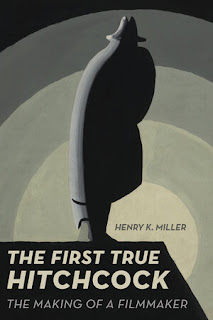
Miller applied the “Page 99 Test” to his new book, The First True Hitchcock: The Making of a Filmmaker, and reported the following:
Page 99 of The First True Hitchcock jumps around quite a bit. The top third tells us about an obscure early sound-film studio in South London, the British branch of De Forest Phonofilms. The next third covers the last days of shooting on the Hitchcock film alluded to in the title, The Lodger, in April 1926. These included location work that give us what I call ‘the film’s only direct trace of the historical moment of its making’, and provide a segue to the last third of the page. For reasons which might seem arbitrary taken out of context, this provides a sketch of the background to the General Strike, which began in May.Follow Henry K. Miller on Twitter.
This jumpiness, this seemingly arbitrary bringing together of disparate elements, is fairly typical of the book. My aim was that over its course some kind of shape would emerge for the reader, but without too much hand-holding from me.
To spell it out here, though, these seemingly disparate elements have more to do with Hitchcock and The Lodger than one might imagine. To give a simple example, Hitchcock claimed to have contemplated making a film about the General Strike.
More significantly, one of my arguments is that The Lodger was, at the time of its release in 1927, a relic. In between shooting and release, seismic changes had occurred in the British film industry, for reasons that I relate to the general political and economic situation of the mid-1920s, including the General Strike, in some ways a symptom of the national post-war malaise. The Lodger was also a relic in that it was a silent film released in the year of The Jazz Singer. In some cinemas its supporting programme included Phonofilms. Some of the Phonofilm pioneers came from Hitchcock’s immediate social circle.
But having said all that, in a sense the arguments are less important to me than the feeling of immersion in the moment, hence the montage effect.
--Marshal Zeringue



